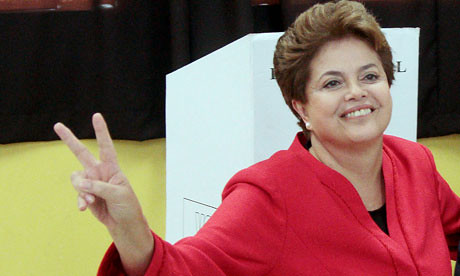
Brazil Worker's Party President Dilma Rousseff won the national run-off elections in the South American state whose economic and political influence is growing throughout the region and the world., a photo by Pan-African News Wire File Photos on Flickr.
Brazil's Rousseff calls for constitutional vote to quell protests
10:16pm EDT
By Brad Haynes and Maria Carolina Marcello
SAO PAULO/BRASILIA (Reuters) - Brazilian President Dilma Rousseff sought to overcome a sudden wave of national discontent with a surprising call on Monday for a referendum on what would be the country's most ambitious political reform in decades.
Rouseff proposed a national vote on amending Brazil's constitution in a meeting with governors and mayors the week after the country's largest protests in 20 years jolted politicians of all stripes. It immediately raised questions about whether she could deliver on such an undertaking as she heads to what may be a more difficult re-election in 2014.
Brazil's last sweeping political reform was 25 years ago, when the current Brazilian constitution was ratified in 1988 by the country's last constitutional assembly, three years after the end of its military dictatorship.
"The streets are telling us that the country wants quality public services, more effective measures to combat corruption ... and responsive political representation," Rousseff said, reiterating her support for the democratic spirit of most protesters gathering in Brazil's biggest cities in recent weeks.
It was unclear how Rousseff sought to address political reform, and analysts said her proposal may only add to concerns about whether she can placate protesters whose demands vary but ultimately come down to disillusionment with government.
A constitutional reform could take years as the government must arrange a public vote calling an assembly to debate the overhaul of Brazil's representative democracy.
"The creation of a Constituent Assembly to deliver a deep cutting political reform could add another element of medium-term uncertainty," wrote Alberto Ramos, chief Latin American economist at Goldman Sachs, in a note to clients.
"These transformational events tend to take a long time and the final outcome is extremely hard to predict," he added.
The president also laid out proposals to expand public transport, improve health services and crack down on corruption - concerns raised by the leaderless protest movement that has shaken markets and threatened her popularity.
Still, a sluggish economy has left the president with little room to maneuver the federal budget and protesters are unlikely to see rapid improvements in their daily lives.
Polls taken before the current wave of demonstrations showed public approval for the left-leaning Rousseff had slipped to around 55 percent - enough to win a second term in a single round of voting. She is widely expected to seek re-election next year.
The recent peak of the mostly peaceful demonstrations came on Thursday, when about a million people took to the streets across Brazil with occasional flashes of violence and vandalism.
The days since then have been calmer but social media points to another round of protests surrounding a Wednesday soccer match between Brazil and Uruguay in the city of Belo Horizonte.
Soccer has become a focal point for protesters objecting to big funding for stadiums for the 2014 World Cup that they believe would be better spent on transport, education and hospitals.
The demands for better public services have raised concerns about looser government spending, which Rousseff sought to head off by introducing her agenda on Monday with a call for fiscal discipline.
Rousseff then proposed an additional 50 billion reais ($22 billion) of investments to address the complaints about public transport that first set off the protests over two weeks ago.
Fare hikes for buses and subways in Sao Paulo and Rio de Janeiro that incited early outrage have since been withdrawn, and the governor of Sao Paulo also announced on Monday plans to roll back higher tolls on the state's highway concessions.
Rousseff also cited demonstrators' demands to lend urgency to parts of her agenda that have faced political resistance, such as setting aside future oil royalties for education and importing doctors from abroad.
She may struggle to find new tax revenue for her proposals, however, as the economy struggles to gain steam, inflation is eating away at purchasing power, and rising interest rates are making consumer credit more costly.
Two years of what many economists decry as fiscal slippage under Rousseff have also made it tougher to increase spending.
Standard & Poor's revised its outlook on long-term ratings for Brazil's sovereign debt this month to negative from stable, citing a deteriorating fiscal outlook and slow economic growth.
($1 = 2.25 Brazilian reais)
(Additional reporting by Caroline Stauffer and Eduardo Simoes in Sao Paulo and Maria Pia Palermo in Rio de Janeiro; Editing by Cynthia Osterman, Mary Milliken and Lisa Shumaker)
No comments:
Post a Comment